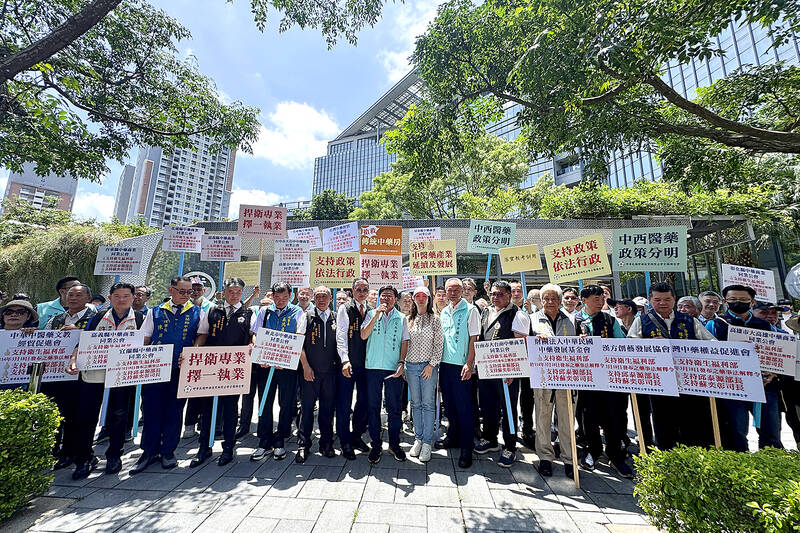Traditional Chinese medicine dealers yesterday urged greater distinction of the industry from Western pharmaceutical manufacturing, and called for the establishment of certification and education in traditional Chinese medicine, as China and South Korea have.
Staging a rally outside the Ministry of Health and Welfare in Taipei yesterday, industry representatives voiced support for the ministry’s March 18 interpretation of the Pharmaceutical Affairs Act (藥事法) and said the interpretation is not taking away the jobs of pharmacists, but instead saving the industry’s production and supply chains.
Under the interpretation, people who graduate from traditional Chinese medicine or crude medicine related departments of a university or college, have acquired 35 credits from core Chinese medicine courses and have more than one year of practical experience at a Chinese medicine dealer can apply for a certificate and register to sell Chinese medicine.

Photo: Chiu Chih-jou, Taipei Times
The interpretation was hailed as an industry lifesaver by the dealers, while pharmacists have repeatedly called it illegal, rendering the pharmaceutical profession useless.
Taiwan Federation of Traditional Chinese Medicine Business Associations chairman Kuo Kun-mao (郭昆茂) said that pharmacists should not seek to dominate traditional Chinese medicine distribution simply because the nation has opted to use the so-called “scientific Chinese medicine.”
“Scientific Chinese medicine” is defined by the ministry as the pharmaceutical processing of herbs and other ingredients used by traditional Chinese medicine into powders, pills and other forms.
Despite widespread use, the identification, processing and storage of basic traditional Chinese medicine ingredients require professional knowledge that is not within the repertoire of pharmacists, Kuo said.
“Pharmacists want to be involved in all related vocations, but are very rarely involved in the vocations they wanted to be included,” Kuo said.
The average monthly salary for traditional Chinese medicine distributors sits at NT$30,000, far lower than the NT$80,000 to NT$90,000 offered at chain pharmacies, Kuo said.
Low wages, combined with unfriendly regulations and environments, have reduced the willingness of young people to enter the industry, Kuo said.
National Union of Chinese Medicine Association of the ROC president Hsieh Ching-tang (謝慶堂) said that there is an established distinction between traditional Chinese medicine and Western medicine, and the government should make doctors to choose which profession they want to be in.
Traditional Chinese medicine should not be under the shadow of Western medicine frameworks, Hsieh said.
The current regulations lack systematic education in traditional Chinese medicine, and do not offer related certification, leaving several thousand operators without a legitimate way to operate, Hsieh said.

Taiwanese were praised for their composure after a video filmed by Taiwanese tourists capturing the moment a magnitude 7.5 earthquake struck Japan’s Aomori Prefecture went viral on social media. The video shows a hotel room shaking violently amid Monday’s quake, with objects falling to the ground. Two Taiwanese began filming with their mobile phones, while two others held the sides of a TV to prevent it from falling. When the shaking stopped, the pair calmly took down the TV and laid it flat on a tatami mat, the video shows. The video also captured the group talking about the safety of their companions bathing

US climber Alex Honnold is to attempt to scale Taipei 101 without a rope and harness in a live Netflix special on Jan. 24, the streaming platform announced on Wednesday. Accounting for the time difference, the two-hour broadcast of Honnold’s climb, called Skyscraper Live, is to air on Jan. 23 in the US, Netflix said in a statement. Honnold, 40, was the first person ever to free solo climb the 900m El Capitan rock formation in Yosemite National Park — a feat that was recorded and later made into the 2018 documentary film Free Solo. Netflix previewed Skyscraper Live in October, after videos

Starting on Jan. 1, YouBike riders must have insurance to use the service, and a six-month trial of NT$5 coupons under certain conditions would be implemented to balance bike shortages, a joint statement from transportation departments across Taipei, New Taipei City and Taoyuan announced yesterday. The rental bike system operator said that coupons would be offered to riders to rent bikes from full stations, for riders who take out an electric-assisted bike from a full station, and for riders who return a bike to an empty station. All riders with YouBike accounts are automatically eligible for the program, and each membership account

A classified Pentagon-produced, multiyear assessment — the Overmatch brief — highlighted unreported Chinese capabilities to destroy US military assets and identified US supply chain choke points, painting a disturbing picture of waning US military might, a New York Times editorial published on Monday said. US Secretary of Defense Pete Hegseth’s comments in November last year that “we lose every time” in Pentagon-conducted war games pitting the US against China further highlighted the uncertainty about the US’ capability to intervene in the event of a Chinese invasion of Taiwan. “It shows the Pentagon’s overreliance on expensive, vulnerable weapons as adversaries field cheap, technologically